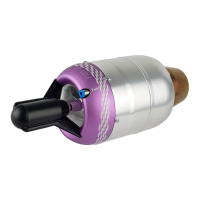PAGE 25 of 54
11. The green OK LED will flash and the display will briefly show “SAVING SETUP DAT“ and then
return to the normal default RUN screen. Return the throttle stick and trim to the minimum position
and the auxiliary channel (if used) to Off and the green OK LED will turn off. This completes the
programming. The ECU will now permanently store the data. Repeating this procedure is only
necessary when the R/C system is changed or adjusted.
Note: This data is permanently stored in the turbine. If you change ECUs, the turbine data will be
copied into the new ECU and the “learn R/C” will not need to be redone
.
Verify failsafe programing
You can verify the failsafe function in the default RUN screen with the GSU. With your receiver and ECU
on, turn off the transmitter. After about two seconds a should display on the screen.
Turn your transmitter back on and the should clear from the screen. The failsafe must function to
operate the turbine in a safe manner.
Preparing fuel and fuel system
Warning!
Obey local laws for the transportation and storage of fuels.
Fire warning!
When mixing the fuel with oil or when operating (fueling, defueling, etc.), never handle near
an open flame.
Please do not spill or empty fuel to the ground.
The JetCat engine can use deodorized kerosene, 1-K kerosene or Jet-A1 for fuel. Fuel must be mixed
with 5% synthetic turbine oil.
Example formula: 1 quart of oil in 5 gallons of fuel.
JetCat recommends low toxicity JetCat oil with anti-static additive or Aeroshell 500 turbine oil although any
turbine oil that conforms to MS23699 standards will work.
To reduce static charges from the fuel system, we recommend adding our anti-static additive (Part# 61198-
00) or JetCat Turbine Oil (Part# 61197-00) with anti-static additive already blended in.
Fueling on board tanks
Please note: Fully synthetic 2-stroke oils or Mobil DTE are not suitable and should not
be used.
Do not fill the on board tanks too quickly. There is capillary resistance in a series tank
system, possibly causing a high pressure rupturing of a tank.

